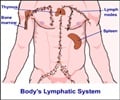A research team, including an Indian-origin boffin, has suggested that radiation treatment directly to the ovaries should be avoided in female cancer patients of reproductive age because
After establishing the direct relationship between certain types of radiation therapy and fertility problems, a research team which included an Indian-origin boffin has cautioned against administering radiation treatment directly to the ovaries in female cancer patients of reproductive age.
Radiation therapy to the pelvic region can cause ovarian failure or result in damage that makes the uterus unable to accommodate the growth of a foetus.These effects are not a great concern to cancer patients past their reproductive years, but due to the growing number of paediatric and young-adult cancer survivors, these effects are increasingly relevant.
Researchers at the Harvard Radiation Oncology Program and the Department of Radiation Oncology at Brigham and Women's Hospital and Dana-Farber Cancer Institute, both in Boston, sought to review the impact of radiation therapy on fertility, pregnancy and neonatal outcomes among female patients and the effectiveness of ovarian transposition, or moving the ovaries out of the field of radiation, as a means of preserving fertility.
The researchers reviewed the outcomes of past studies that reported fertility, pregnancy and neonatal outcomes as a result of cranio-spinal, abdominal and pelvic radiation and determined that cranio-spinal irradiation caused hormonal changes that affected a woman's ability to become pregnant later in life.
They found that women who received abdominal or pelvic radiation had an increased risk of uterine dysfunction that led to miscarriage, preterm labour, low birth weight and placental abnormalities.
The researchers also found that women who received low doses of ovarian radiation could suffer early menopause.
Advertisement
"Female patients who are not past their reproductive years would be best served by a multidisciplinary team of caregivers, including a radiation oncologist, pediatric oncologist, medical oncologist, a reproductive endocrinologist or gynecologist, and a maternal fetal medicine specialist," Akila Viswanathan, M.D., M.P.H., senior author and a radiation oncologist at the Brigham and Women's Hospital and Dana Farber Cancer Institute, said.
Advertisement
The study has been published in the April 1 issue of the International Journal of Radiation Oncology Biology Physics.
Source-ANI
TAN















